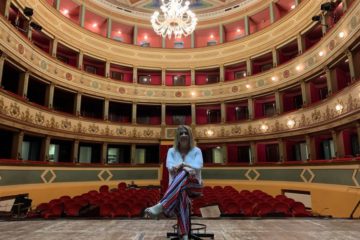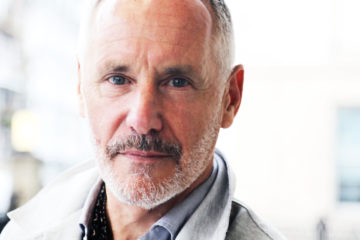Countertenor John Holiday is currently performing Bernstein’s Chichester Psalms with the Los Angeles Philharmonic. I am thrilled that John was willing to take the time to answer a few of my questions about this production, his background, and his passion for opera.
Tell me about your upcoming performance of Chichester Psalms. Let’s start with the work itself. What does it mean to you? Is it something modern audiences can connect with?
This masterpiece of music is so extraordinary, and I’m looking forward to getting to perform it for the third time. This time I will be making my debut with the phenomenal Los Angeles Philharmonic under the baton of Maestro Dudamel, which will also be my first time working with him. This is a piece of music that speaks to my soul and spirit on so many levels, so much so that it’s hard for me to keep still during performance. It is a piece that anyone can relate to, and I’m so happy to be a part of it.

John Holiday
What about this particular production of it – is there anything notable or unconventional in the staging or performance?
After having done Bernstein’s Chichester Psalms with Atlanta Symphony Orchestra and Phoenix Symphony, I am happy to say that this will be my debut with Los Angeles Philharmonic and I am looking forward to working with Maestro Dudamel in my favorite city in the United States. Because it is the first time I’ll be working with the Los Angeles Philharmonic, I’m not sure if there are certain aspects of it that will be different, but my first thought is to let the music and text speak.
Tell me about The Crypt Sessions. I see you’ve got a performance coming up on April 26. Will audiences hear the same kind of repertoire they hear in the opera house?
I’m looking forward to The Crypt Sessions on April 26th and bringing my recital to the audience. Yes, of course, the audience will hear the same kind of repertoire that they would hear in the opera house, but they will hear an entire set or two of jazz standards, spirituals, and other popular music, which I think our audiences need to hear.
I read in your bio that you left Indiana University while you were studying at the Jacobs School of Music to go teach choral music at a junior high. What led you to this decision?
You are correct. In 2007, after I finished my undergraduate studies at Southern Methodist University, I journeyed to Bloomington, Indiana to become a candidate for the Artist Diploma in Performance at The Jacobs School of Music at Indiana University where I studied with the Mezzo-Soprano Marietta Simpson. I had the time of my life studying with her and soaking up everything that IU had to offer. However, at one point, I noticed that I was not very happy being there. Not because of the school, but because of the city. It wasn’t a place that I found suitable to me or my personality, so I left. I went back home to Rosenberg, Texas where I was the head of the choral department for Lamar Junior High School and the teacher of Vocal Studies at Lamar Consolidated High School. Truly, I had the time of my life teaching, and I would do it all over again.
Do you miss teaching? Do you do any now?
Do I miss teaching? No, but that’s because I’m still doing it! Currently, in addition to my career as an opera singer, I’m also a professor of voice at The Conservatory of Music at Lawrence University in Appleton, WI which has been bringing me so much joy. When a student understands a new concept and totally gets it, it makes me thrilled for them and the possibilities of what can be.

John Holiday
The countertenor repertoire is relatively small when we consider the standard repertory at major opera houses these days. That said, what are some of the major countertenor roles?
That depends on how you look at it, but I don’t find that the repertoire is limited. There are a ton of opera roles that are out there for countertenors. Often times, though, the works are obscure or they’re not done often. Most of the countertenor roles done are the ones sung by the famed castrato, Senesino, but here is a list of roles that are commonly done by countertenors: Tolomeo in Tolomeo; Giulio Cesare, Tolomeo, Sesto and Nireno in Giulio Cesare in Egitto; Bertarido in Rodelinda; Radamisto in Radamisto; Orfeo in Orfeo ed Euridice; Refugee in Flight, and so much more.
Do you have a favorite?
I’m asked that question a lot, but what I have found is that the joy and “favor” is in the work. I’m thankful, without ceasing, for every opportunity, so it’s hard for me to pinpoint one role. They’ve all been special to me, and I wouldn’t be the artist that I am without having had the opportunity to get onto the stage to sing these wonderful roles and give life to these amazing and complex characters.
What kind of music do you listen to?
I listen to everything! Right now, Cardi B, Jidenna, Garth Brooks, Jill Scott, Drake, and Jonathan Dove’s Flight!
How do you spend your time when you’re not traveling or performing?
When I’m not traveling or on the stage, I spend my time with my dogs and husband. I like to get on the floor and play with my dogs and enjoy them as much as I can.
To finish, I’d like to ask a question I ask everyone: what is it about opera that touches your soul?
I don’t know that I can explain it, but it’s a feeling that it gives me. When opera is done right, it’s an art form that induces goosebumps and makes me feel the entire gamut of emotions. I’ve been moved to tears because of something being communicated on stage. Great singing, communication, and commitment to character is something that really touches me, and I am lucky because I get see and hear so many wonderful artists commit to it every day.


